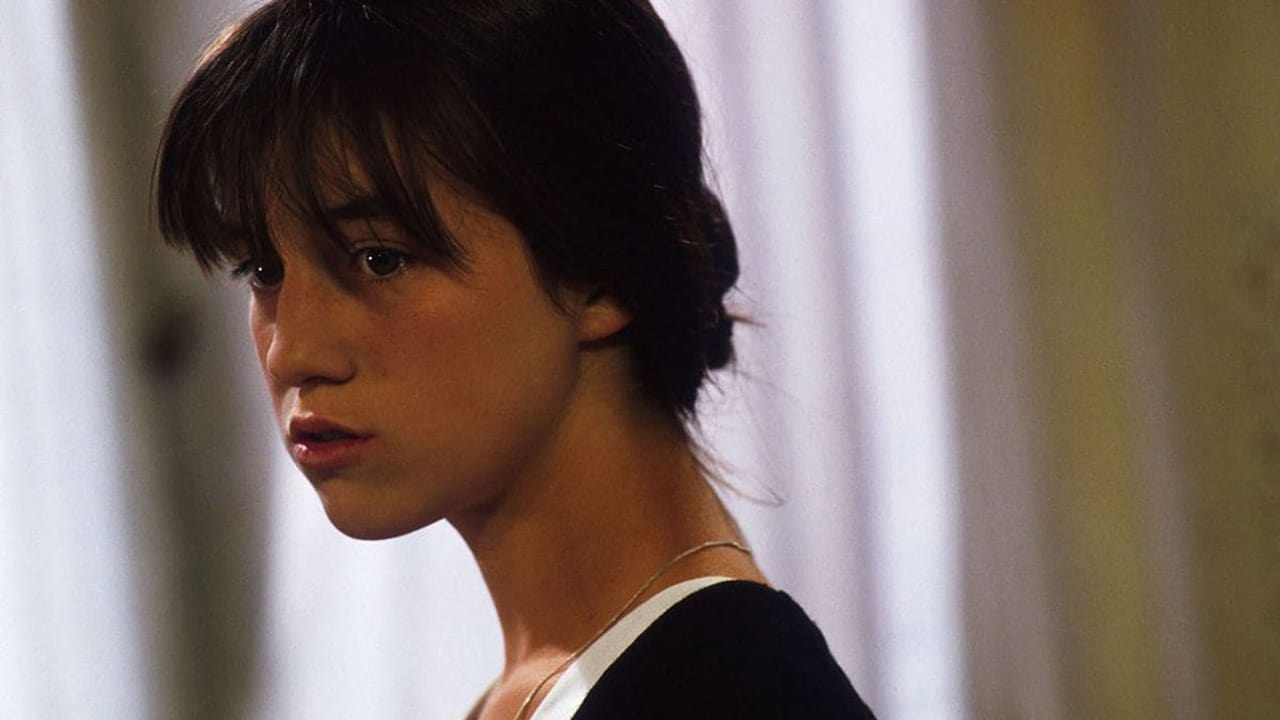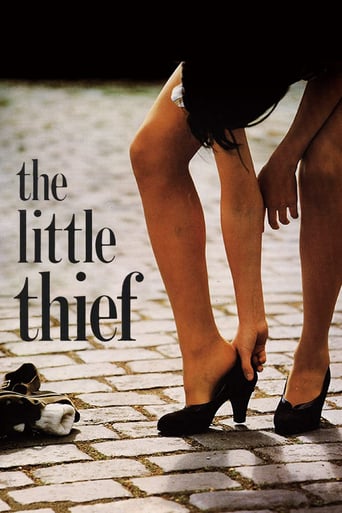

It's a good thing this belated tribute to Francois Truffaut was adapted from an original story by the late director himself; otherwise the film might be mistaken for a plagiarism. The story itself is a distaff companion piece to 'The 400 Blows', following a compulsive teenage kleptomaniac in post-War France, whose sticky fingers and rebellious disposition land her in and out of jail, and in and out of love. Charlotte Gainsbourg is certainly appealing in the title role, but Claude Miller's direction is perfunctory, at best; he places each scene in the correct order but has little feeling for the material, other than an obvious respect for its author, whose name alone is enough to lend the film some token credibility. Enough incidental pleasures survive the awkward adaptation to make it a worthwhile diversion for any dedicated Francophile, and a must-see for die-hard Truffaut fans, but the film suffers from an ending that might lead viewers to suspect Miller was working from an incomplete outline.
... View MoreAs usual, when commenting on a (typical) European movie, I am not going to sheepishly quote pseudo-poets like Bob Dylan or talk pretentiously about the "recurring alienation theme". (If you're a Marxist, hence obsessed with alienation, then you'll pretty much see it everywhere - even in a Bugs Bunny cartoon.) I prefer to say it like it is. If you're a loveur of la cinema Francophonique and everything Truffautesque, you might want to skip this text.LPV is yet another typical French male fantasy with distinct Lolita overtones. No other nation in the world makes so little effort in hiding this passion on the big screen. Quite to the contrary, they love this stuff and will probably never tire of making movies in which young female nymphomaniacs throw themselves at middle-aged men. (Doesn't that remind you of the plot of every other porn film?) To be fair, one cannot speak of pedophilia here because a fully-developed 17 year-old Gainsbourg plays a 16 year-old (which might disappoint some Lolita-movie purists posing as connoisseurs of filmic art). However, we do have a young - and in certain ways very naive - virgin here seeking sex. That's tacky enough as it is.As I mentioned, it's not the middle-aged man who hunts down the nubile - it's the other way round. This premise has less realism to it than the story of Dumbo the Flying Elephant. And guess what? As in any fantasy, the middle-aged man at first REJECTS the girl's sexual advances - on moral grounds. Ah, these movie men have such impenetrable moral fiber! Or almost: eventually he succumbs to her charms, and does it with her, after which the director is only too happy to satisfy the male segment of the film's audience by showing Gainsbourg's breasts in full view. (Not that I'm complaining about nudity, but then don't pretend it's "arte".) Not that he himself deflowers her. Young and crazy Gainsbourg was far too impatient for this middle-aged man to finally come around, so she did it first with a ginger handyman she'd just met. All in all, she has sex with three different men (not all middle-aged buffoons, to Truffaut's credit). The total sum would have been four, but the Catholic priest rejected her offer early on in the movie. (Hmm, I do wonder why...) LPV, in spite of its faults, is fairly watchable, somewhat entertaining; the plot moves at a brisk pace with plenty of things happening - even if half of them lack credibility or are plain moronic. However, while it does have a beginning, LPV has no middle or end. It just trots along like the first installment of a 6-part TV mini-series bio. The "ending" constitutes of a pitiful, brief epilogue which serves as a poor substitute for a real conclusion. (Or was Truffaut aiming for a Lolitaesque "Star Wars"-type saga that covers different epochs of the life of a young harlot? We'll never know...) The epilogue informs us that she (predictably) changed her mind about having an abortion, and that her doctor said that the infant's over-activity in the womb indicates it might turn out to be a hyperactive little moron - just like its mother! Touching. And so informative.The other problem with the movie is that it's not easy to either identify with or sympathize - hence to be too interested - in the trials, tribulations and mishaps of a mostly unlikable, lying, thieving, promiscuous, treacherous, borderline-retarded little slag. Perhaps you have to be a film student to laugh at a bomb being thrown at a bunch of cows... I don't see what's supposed to be so damn "cute" about theft. This is not some silly heist comedy in which immoral behaviour can be laughed at and dismissed as a mere movie gimmick. However, it isn't surprising: European movies, and particularly French ones, have often been mysteriously devoid of morality, with decadence lurking around every corner. (Ah, those Socialists and their hedonism... such role-models for the youth...) Another example of this is when Gainsbourg's female boss congratulates her for hooking up with a married man: "A married man, huh? Bravo!" she says, and this is a PREGNANT woman we're talking about here. Typically, her reaction wasn't meant to be either funny or full of hypocrisy. Another reminder where this movie was made... From whom did Gainsbourg learn to break into locked houses? Was the director trying to present us with your average juvenile delinquent or was he giving us a glimpse into the life of a master criminal in-the-making? Silly.Yes, Truffaut must be a genius for writing a Lolita script about a dumb, horny girl. She must be utterly alienated from society, and I'd quote some Bob Dylan poetry right now if only I cared to remember any of that charlatan's lyrics...
... View MoreShe steals from the church to go to the movies. Janine, you've got to like her. But her own life is unlike the song-and-dance pictures she likes so much. It's more like a ballad, set to music in a minor key. As Bob Dylan famously put it: "She'd come away from a broken home, had lots of strange affairs, with men in every walk of life which took her everywhere." While Janine may have the genes of a flirt and a crook, it's the men she meets that take her from petty theft to grand larceny. She finds out the hard way there are limits even for a pretty girl and ends up in a nunnery that is half poorhouse, half prison. By showing us what she does, rather than narrating what happens to her, Claude Miller brings to life a story (written by none other than François Truffaut himself) that may easily have turned out corny at a lesser man's hands. The 1950s rural and Parisian sets are designed with just the right mixture of dedication and détente to make you forget it's only make-belief. The whole thing feels entirely natural and deeply touching at the same time. The biggest credit, of course, is due to the amazing Charlotte Gainsbourg and her arresting performance in the part of Janine. She resists the temptation of playing her as a teenage martyr and makes her a cheeky Cinderella instead.
... View MoreOriginally, "the little thief" is a movie that François Truffaut was to shot. Indeed, he was dreaming of a feminized version of his movie "les 400 coups" (1959). Unfortunately, he died before he could make his film. So, it was Claude Miller who took over and put in pictures a story with recurrent topics in Truffaut's work such as childhood, education. The whole may not reach the peak of "les 400 coups" but it is after all a decent work although opinion is a little divided about it. I think the movie is especially worth for Charlotte Gainsbourg, full of freshness. Her amazing performance is enough to justify the trip and the vision of the film. She epitomizes with a lot of conviction the role of this teenager searching for real love and a better life. More simply, she nearly carries the whole movie on her shoulders. But, don't neglect the other obvious qualities that Miller's movie contains: the quality of the screenplay, the subtlety of the making and a quite faithful reconstruction of the France after the Second World War.A light and nice movie. Truffaut would probably have approved the result.
... View More